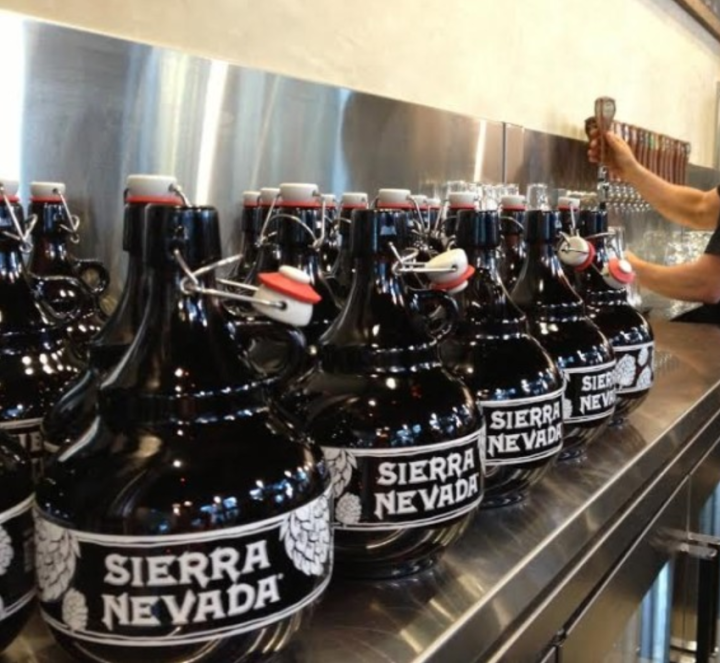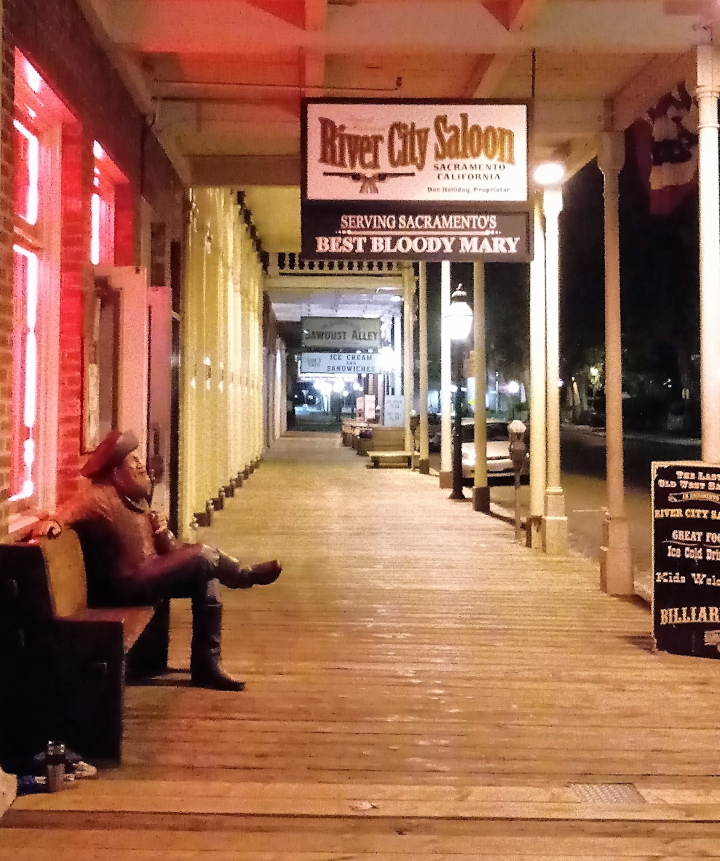I think it’s finally time to call it quits on this epic work day and head home. But wait! It has been a stressful day (/year) and you decide that a drink is in order. Time to head to your favorite pub for a swift half, or whatever’s your poison. But have you ever considered: How sustainable is your local?

Is your local pub sustainable?
At first glance, there may not appear to be many social or environmental factors to consider when rating bars (compared to, say, restaurants or cell phones) but there are actually quite a few. Of course there are – otherwise, I wouldn’t be writing this post! So, I’m going to highlight some of them, giving examples of Green Stars Reviews of various pubs that I’ve posted on TripAdvisor, Google Maps, or Yelp (click on names below to see the reviews).
Packaging and transportation of beer
With the huge surge in the popularity of craft beer, the number of brewpubs has shot up over the last few years. Beer that’s brewed on site has significantly lower carbon (transportation) and material (packaging) footprints. Next best is local draught beer (transported in reusable kegs), bearing in mind that this is sometimes the best option if that brewery does a particularly good job on sustainability. Then there’s local beer sold in cans or bottles and, in last place, canned or bottled beer from distant lands. Here’s an article on the debate of cans versus bottles. Many brewpubs now sell beer to go in reusable glass growlers, so you never have to buy packaged beer again if you don’t want to!

If you’re dealing with a regular bar rather than a brewpub then just take note that some are much better at supporting local breweries than others. The Mutton Lane Inn in Cork, Ireland, is a great pub that supports local brewers (like Franciscan Well) and microbreweries (Rising Sons).

Sustainability in the brewing industry
Brewing can have a large impact on the environment so your favorite brewery should have something to say about sustainability (particularly the larger ones). Water use (especially in dry climates), energy use, and waste generation (What happens to the spent grain?) are three things to look out for. Of the bigger breweries in the US, I’m partial to Sierra Nevada and New Belgium. Here’s an excerpt from my review of the Torpedo Room, Sierra’s tasting room in Berkeley, CA.
Sierra Nevada has made good strides towards reducing their carbon footprint by introducing solar panels, fuel cells, and more recently microturbines (the last two are powered by biogas generated by treating their wastewater in anaerobic digesters). They recover and recycle their carbon dioxide (generated during brewing, required for moving and packaging beer) instead of releasing CO2 from brewing and then purchasing more. They have multiple programs for conserving water such as rainwater collection at their Mills River brewery. They were listed as a platinum level Zero Waste Facility in 2013 since 99.8% of their waste is diverted from landfill. They run their own compost facility in Chico, and use compost in their estate fields. They even built their own rail spur to reduce trucking miles.
Beer ingredient sustainability
The base ingredients for your beer should be grain (barley, wheat, or sometimes rice) and hops. Unless you drink Bud Light Lime, in which case you can include corn and high-fructose corn syrup too – but this is a post about beer, not Bud Light! The hops are more demanding to grow and generally have a large water footprint – so you could say that IPAs (which contain more hops) have a larger footprint than other beers. (I don’t mind saying that because IPA is one of my least favorite styles of beer, haha). But some hop growers have been making strides towards sustainability – here’s a quote from my review of Novel Brewing Company in Oakland, CA, who use YCH hops:
Suppliers include YCH hops, a progressive company that supports Pacific Northwest farmers by returning 78% of the price of the hops to them (if only more Ag business worked this way) and encourages sustainable farming.
Beer made from organic grain has been slow to take off (but you can find it) – here’s a good article on the subject. Even if the beer is not made with organic barley it’s often worth taking a look at ingredient sourcing. The Kauai Beer Company has to import grain from the mainland but uses local fruit (e.g., for their lilikoi kombucha) and honey from the Big Island. Dunsmuir Brewing Works, who I visited on my Amtrak California rail pass, also uses local honey.
Pub sustainability: food and waste
If the pub you’re evaluating offers food then you can take that into account using some of the factors outlined in previous posts on restaurants. I like pubs that offer a simple packaging-free snack, like popcorn, and perhaps allow you to bring your own food.
Hoi Polloi in Berkeley:
They air-pop their popcorn and serve it in wooden bowls – it’s hard to think of a more sustainable and packaging-free way to serve snacks.
River City Saloon in Sacramento:
I liked the simple snack of roasted peanuts – no packaging waste! Peanuts, being legumes, are one of the most sustainable snacks you can find.

I was in a bar last weekend where some beers were served in glasses while others were inexplicably served in plastic cups – you’re going to lose at least one Green Star for that, mate! I would also reduce the Green Star rating of a bar for overuse of plastic straws or other unnecessary tat. Speaking of waste, I want to give a quick shout-out to Toast Ale in the UK (and now also in the Bronx) who use leftover bread along with grain for their brews and donate all profits to Feedback, a food-waste charity.
Your “local” and your community
It’s also worth taking into account (and awarding an extra Green Star) for pubs that support local charities or community events. For example, Gilman Brewing in Berkeley:
They have a promotion where for every pint of Cheval de Fer bought, $1 is donated to ALS research.
And the Novel Brewing Company in Oakland:
They sometimes run fundraisers supporting charities such as Berkeley Humane.
***
Some of these things may seem like a small deal, but they are good indications of which places are worthy of support, and in the big scheme of things these little things do make a big difference.
Cheers!

I’ve always liked supporting local breweries out of a sense of community and loyalty, but I never considered it from the standpoint of sustainability, so thank you. I’ll be making even more effort to support local brewers, particularly those who are working to be more sustainable.
LikeLiked by 2 people
Good idea, Lyz: drink more beer! Glad to hear it makes sense. Same goes for restaurants – I don’t need a Thai or Indian beer to go with my meal (unless I’m in Thailand or India!), I’d rather have something local rather than a beer that’s shipped across the world and is not any better than a local beer in any case.
LikeLiked by 1 person
Quite true. Besides, my part of the country has many local breweries and, as you mentioned, more popping up all the time. That’s more than enough to choose from.
LikeLiked by 1 person
“I was in a bar last weekend where some beers were served in glasses while others were inexplicably served in plastic cups”
– regardless of lack of sustainability, any bar that uses awful ware should be shunned – who the hell wants to drink out of plastic?
Nice post with some good points – well done!
LikeLiked by 1 person
Thank you! Not too much jargon, I hope 😉
LikeLiked by 1 person
Some interesting ideas for sustainability. I do not drink alcohol but I do like the idea of supporting local breweries. 😊
LikeLiked by 1 person